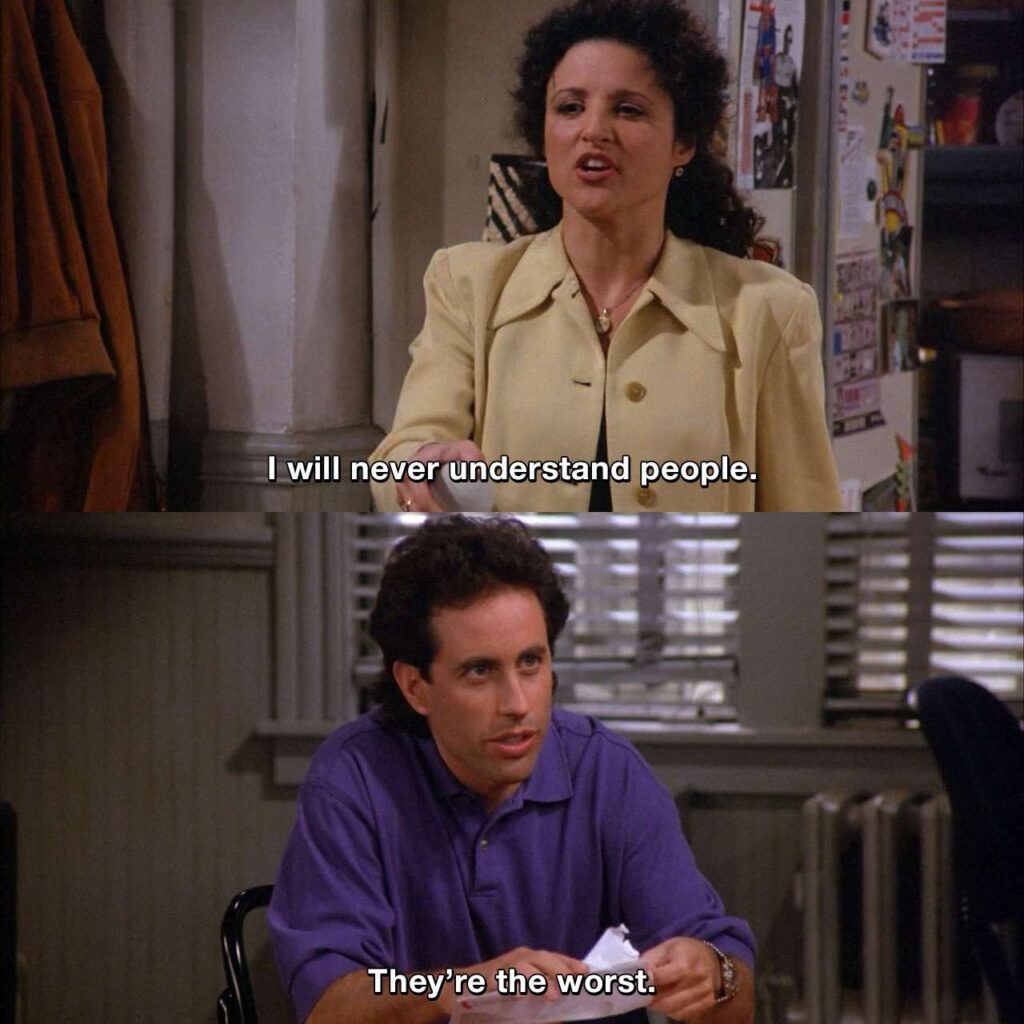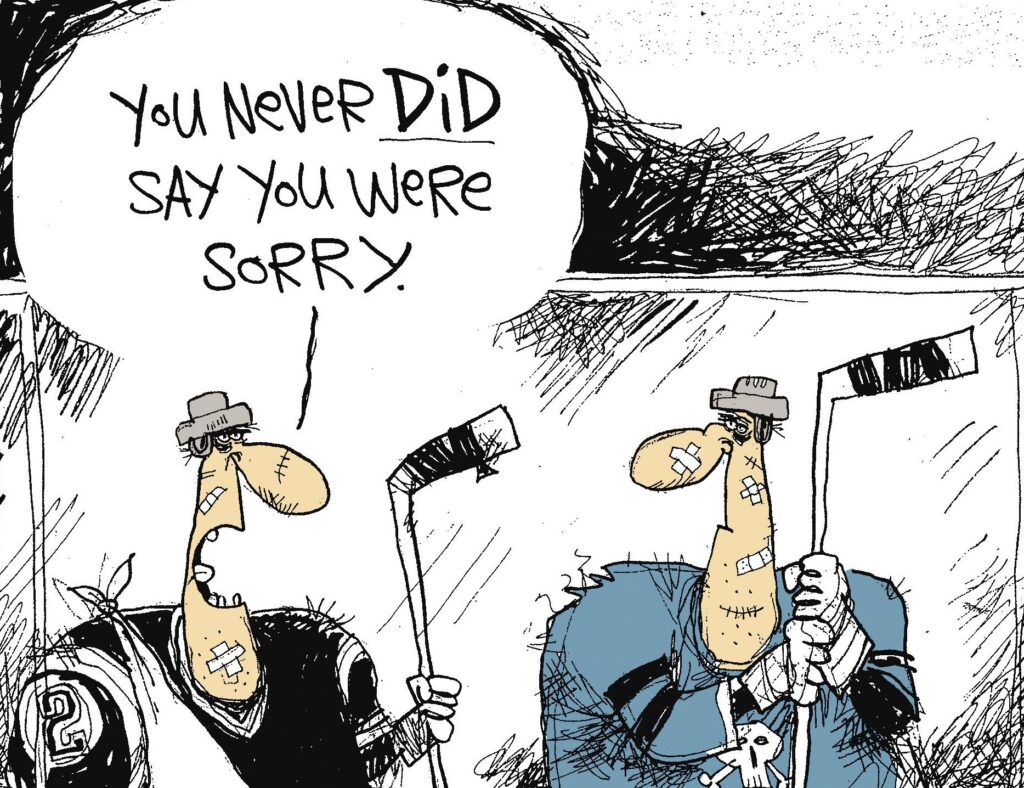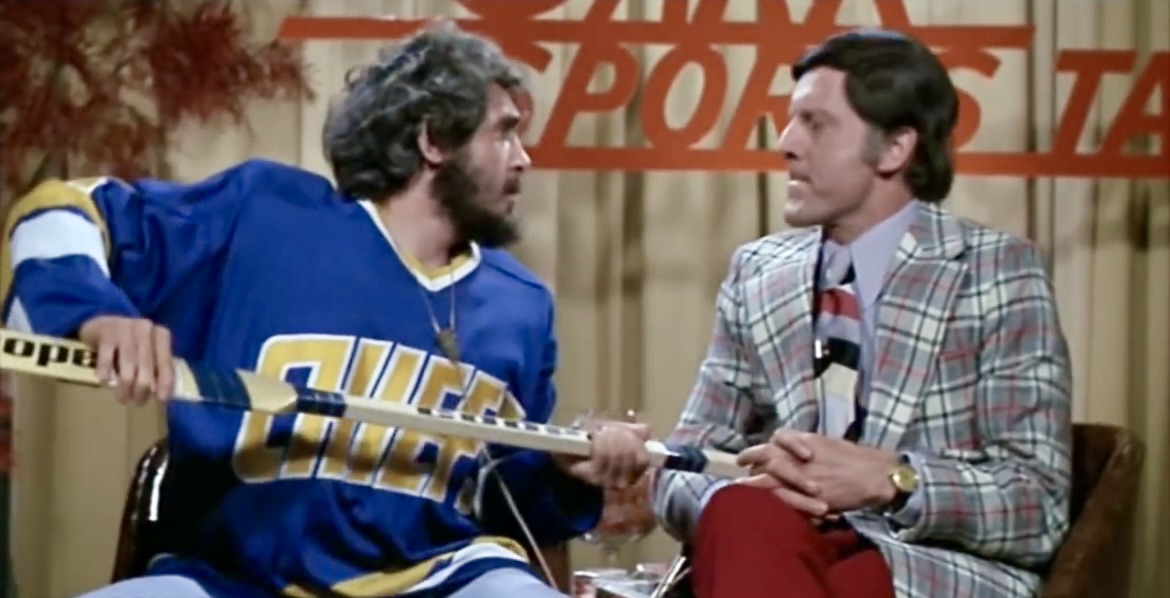There’s a six-second clip from a Seinfeld episode that pretty much sums up the four main characters’ attitudes toward humanity:
Elaine: “I will never understand people.”
Jerry: “They’re the worst.”

The nonchalant cadence in Jerry’s voice is the funniest part of the scene. But even if you’re just reading it off the page, the joke hits home — because it’s universal. On a daily basis, we all see other people doing things that are total head-scratchers.
Most of these moronic gestures are so trifling that beyond noticing them and maybe getting a laugh, we move on to our next thought.
But what about the idiotically selfish things that people do that harm others, or just contribute to a more callous society? Parking in a handicapped space. Berating a service worker. Lying in business. Cheating in a “contest.” Etc., etc.
Before we go any further, let me spit out the obvious: I’m just as guilty of behaving badly as anyone else out there. If not worse (spent over a decade in Chicago politics)…
But each year on Yom Kippur, when I fast for one day to atone for my misdeeds over the previous 364 — it feels like I’m getting off the hook wayyy too easy. The ritual of confession seems similarly lacking to me. They’re shortcuts. Voluntary acts of remorse that lack any real consequence; no basis for self-deterrence. And you can absolve your sins in bulk.
When our children cross the line, we often give them a “timeout.” Or some other form of customized parental punishment.
Teenagers? “You’re grounded!” Or perhaps a school suspension.
Convicted criminals? Their punishment gets dictated by law.
But what about that massive sweet spot of adults who are neither kids nor convicts? Half of the world’s population stretches between the ages of 25 and 65. Should all of us just be able to do our awful stuff anytime we want — scot-free?
In the world of sports, acts of cheating or foul play result in a cost to the offender or their team. Pitcher hits a batter? Take your base. Helmet to helmet contact? Fifteen yards. And so on.
To me, the most classic of all sanctions in team sports is the penalty box in hockey — because it is an actual box.
NHL hockey is an awesome game to begin with: the speed of the action, the physical contact, the sick stick-handling, the thrill of the goal. Among the pro athletes I used to interview way back when, hockey players were the true badasses. Not a whiner among them.
That’s why I find it hilarious when one of these guys gets sent to the penalty box to sit on their ass — with a camera on them for at least a part of their sentence. They’re grown men! They might as well be wearing a dunce cap.

Anyone who’s a fan of the classic comedy Slap Shot remembers the opening scene where the thick-accented goalie, “Denis Lemieux,” explains all of the possible penalties to sportscaster “Jim Carr.” At the end, after pointing out that committing any penalty is “berry bad,” Lemieux puts his personal touch on the consequences:
“You do dat, you go to the box, you know, two minutes by yourself and, you…feel shame. You know. And then you get free.”

Shame! For what other reason would you have to sit in a glass encased closet in front of the entire stadium and TV audience? Public shame! (watch some of the all-time penalty box highlights here)
You can probably see where I’m going with this: The human race is desperately in need of a Daily Life Penalty Box.
It would be virtual, of course. You’d really just be frozen in time for a minute or two (most penalties — in hockey and in life — are “minors”).

Being in the Box — the “sin bin” — would be sort of like being instantly transported into an episode of “Hollywood Squares.” But through the magic of A.I., we could also see all of the other people who are serving time — and for what specific infractions:
- “Doesn’t Clean Up When His Pup Drops A Deuce”
- “Stops Short And Doesn’t Use Turn Signals”
- “Tells Hateful Jokes While Oblivious That They Aren’t Funny”
- “Slept With His Best Friend’s Fiancé” (more of a five-minute major)
No hard core confinement. No prison bars. Not even a yucky smelling hospital waiting-room. Just a little breather. Spent virtually, and publicly.
So how would 8 billion people across 195 countries be able to agree on what kind of acts warrant punishable offenses — and the corresponding sentences? Details, details… Let the Gen Zers survey the world and then we’ll blue-ribbon-committee the thing from there.
The point is to see if we can help to make people — all of us — suck a little less. At the same time, I confess, it could also be massively entertaining.
There’s a famous quote that for years has been misattributed to C.S. Lewis:
“Integrity is doing the right thing, even when no one is watching.”
It was really written by Charles Marshall. But that’s the kind of inadvertent, esoteric error that would never land you in the bin.
Marshall’s point is that living with integrity is a free will thing. The Daily Life Penalty Box would not have the power to override that fact. It would just positively motivate us a little more.
Or not. The personal choices we make would still reside within our minds. The decision is always ours on just how much of a moron we want to act like in any given circumstance.
I’m thinking this thing may have legs. Gotta make a few calls.
Right after I throw my kitchen garbage into my neighbor’s trash can. That garlic shrimp last night really reeked.


